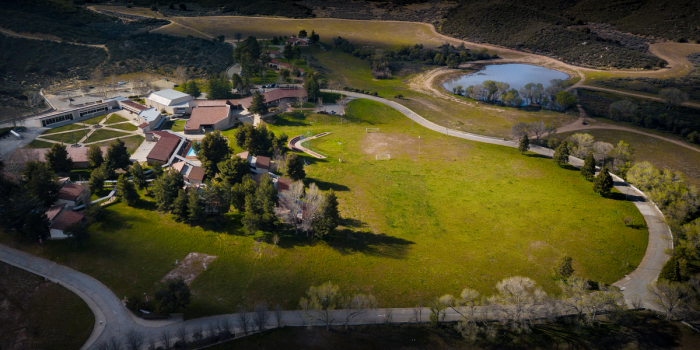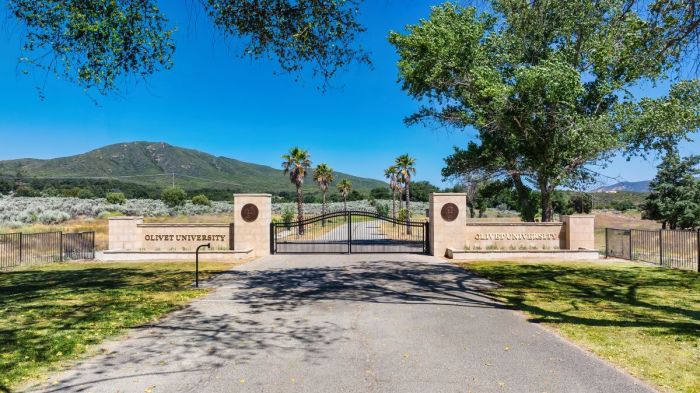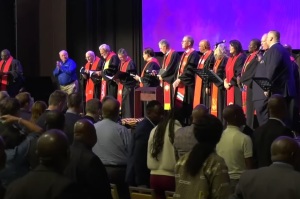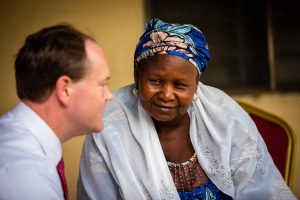Bible college claims religious exemption as Calif. regulators revoke credentials

A California regulatory agency has revoked a Bible school’s permission to operate in the state, but school officials claim they are being discriminated against and can still operate under state religious exemption laws.
Olivet University, a Christian Bible college headquartered in Anza, California, lost its general approval to operate in the state last week after California's Department of Consumer Affairs (DCA) accepted the decision of a state administrative law judge that the school had failed to meet multiple state education standards for administration.
The school insisted on Tuesday, however, that it would continue to operate in the state “uninterrupted” under a religious exemption.
“In response to recent media reports suggesting that Olivet University has ceased operations in California, we firmly clarify that this information is false,” the school said in a statement.
"The University operates in California under religious exemption, enabling us to provide uninterrupted education to theology students from bachelor's and master's degrees to doctorate degrees, who comprise the majority of our student body."
Olivet's lawyer referenced CA Education Code (CEC) 94874.7, which is the Verification of Exemption section, and highlighted that according to this code, the religious school "may request, and obtain, from the bureau verification that the institution is exempt." The legal advisor emphasized that the key word is "may" and Olivet is not required to request exemption but as long as the institution meets all the exemption criteria, they are exempt.
The school cites its accreditation body ABHE's handbook, which says "Some jurisdictions will allow operation without registration due to 'religious exemption' while others will expect formal registration and/or approval."
Olivet President Jonathan Park admits more time and discussion are needed with ABHE if the school can actually maintain its accreditation status as a religious exempt institution.
Last week's finalization of Judge Debra Nye-Perkins' decision to revoke Olivet's permission to operate in California came after a two-year process triggered by a Newsweek reporter contacting the Bureau for Private Postsecondary Education (BPPE), a regulatory agency within the DCA, about allegations of Olivet's engagement in human trafficking, according to official BPPE documents, which CP has reviewed.
Olivet school officials have denied the human trafficking allegation and say they are victims of a T-visa scheme by several former students.
BPPE proceeded with an investigation into the school that included unannounced site visits in November 2022 and January 2023 to Olivet's three California campuses in Anza, Mill Valley and Los Angeles.

In an order issued on Dec. 5 and finalized on Dec. 10, Nye-Perkins instructed Olivet to stop enrolling new students “in all education programs beginning on the effective date of this decision” and propose a teach-out plan for current students within 30 days.
Nye-Perkins acknowledged the university’s claims of bias but revoked its general approval to operate anyway, arguing that it is the only way to “ensure public protection” after reviewing a complaint from the BPPE outlining 14 causes for discipline against the university, and listening to testimony from all parties involved.
BPPE's complaint outlining causes for discipline included: merging of classes that could cause learning impairment, hybrid-learning designated classes failing to have a component of face-to-face instruction, failing to have updated and current faculty contracts, and failing to maintain Student Performance Fact Sheets (SPFS) data in its entirely, among others.
In particular, the SPFS issue was highlighted because Olivet was cited by BPPE previously for failing to provide any SPFS data during an unannounced visit to the Anza campus in February 2019. BPPE issued a citation on Jan. 28, 2020, after Olivet failed to provide SPFS backup data as requested, an administrative fine of $5,000, and the school was ordered to have a written policy of how it would comply with SPFS submission requirements in the future.
The SPFS contains information about students' graduation rates, job placement statistics, and salary and wage data, to help prospective students have transparent information about a private postsecondary institution's performance.
During the 2022 BPPE unannounced visit, Olivet provided some SPFS backup data — as opposed to none in 2019 — but the quantity and quality were deemed insufficient to meet BPPE standards.
"Despite this citation and Order of Abatement, respondent continued to violate California Code of Regulations, title 5, section 74112, as set forth above," Nye-Perkins noted.
The judge found that the BPPE had fully established all the allegations against Olivet except for one cause of discipline, which she found the BPPE had only partially established. The judge also ordered Olivet to pay some $64,000 to cover the cost of the enforcement and the BPPE investigation.
During a hearing prior to Nye-Perkins’ decision, Olivet President Jonathan Park, who assumed his post in June, testified that he believes the school was not treated fairly by the BPPE compared with other universities because of media allegations, particularly by Newsweek.
The university has also consistently alleged through attorneys that Newsweek had actively pushed for Olivet to lose its permission to operate in the state of California, similar to how actors with the publication influenced education officials in New York to not renew the school's permit to operate.
It was pointed out that both Newsweek co-owners Dev Pragad and Johnathan Davis were, at one point, active members of World Olivet Assembly, the global denomination affiliated with Olivet University, and they both had ties to the school. Pragad and Davis are both reportedly no longer members of the denomination.
Olivet’s lawyers insist that Newsweek has been fueling an ongoing campaign to damage the school’s reputation with negative reporting. The university reported that it filed a defamation lawsuit against Newsweek on June 30, 2023.

Since the order by Nye-Perkins, there has been much speculation about the future of the university, which largely serves international Christian students from countries with significant religious persecution.
In a response to BPPE’s complaint, Olivet officials stated that more than 90% of tuition for their students in the last five years has been covered by scholarships and grants from successful alumni or the school, and raised concern about how the revocation of its license to operate could impact students.
“If Olivet’s license were revoked pursuant to this Accusation, all these students would be harmed; not only losing the opportunity to finish their degree, but forcing them to have to leave the U.S. The majority of students studying in Olivet’s theology programs are from countries where Christians are subject to extreme discrimination,” the school argued. “Should they lose the opportunity to study at Olivet, it’s not easy for them to find other ways to pursue their study in their own country where Christianity is persecuted.”
The Association for Biblical Higher Education in Canada and the United States (ABHE), which serves as the accrediting body for the more than 30 graduate and undergraduate degree and certificate programs offered by the school, was asked by The Christian Post how Olivet's loss of BPPE’s approval to operate in California might affect its eligibility for accreditation by its standards.
Lisa L. Beatty, executive director of the ABHE’s Commission on Accreditation, pointed CP to the ABHE’s Institutional Accreditation Conditions of Eligibility, which states in part that in order to be eligible for accreditation: “The institution must document authorization by all relevant governmental agencies to operate as an educational institution and to grant all degrees, certificates, and diplomas that it awards.”
The ABHE last reviewed Olivet University on Feb. 14 and found the school in good standing.
“Accredited status is granted to those institutions that evidence substantial compliance with ABHE’s Institutional Accreditation Standards, including documentation of the appropriateness, rigor, and achievement of stated student learning outcomes and all other Title IV eligibility requirements,” the ABHE notes on Olivet University’s Accreditation Fact Sheet.
During the hearing, BPPE special investigator Robert Dawkins testified about what he saw during his unannounced visit to the Anza campus on Nov. 15, 2022. He was told by former Olivet President Matthias Gebhardt that there were 80 students enrolled but when he toured living quarters, classrooms and the campus, he only saw one student and one faculty member during that time.
Later he was brought by another BPPE staff to observe a classroom where Microeconomics (ECON 310) and Microeconomics (ECON 610) were being taught and noted, "there were only seven students present with the instructor not present but appearing by live stream," according to court documents. "[T]he students were not interacting with the instructor but were just observing."
Joanna Murray, a senior education specialist with the BPPE, testified about concerns she had while observing a class for Old Testament II at the Mill Valley campus, during the BPPE unannounced visit on January 31, 2023.
Murray sat at the back of the classroom of Old Testament II and observed as the professor lectured the class of five students.
"Ms. Murray stated that the class was scheduled from 1:30 p.m. to 3:30 p.m., and this was a four-unit class and should be meeting four hours per week. However, this class was only scheduled for two hours per week,” documents recorded. “Additionally, the class actually met for only one hour and 15 minutes and went from 1:30 p.m. to 2:45 p.m."
Murray observed the professor instructing the students to turn to the Bible and look up verses. She said the students were assigned a Bible and a reflection paper at the end of the class which didn't seem to have enough rigor for a graduate level course.
"Ms. Murray also noted that the five students in this class were master’s degree level students and were ‘a couple of quarters into their master’s program,’" the document recorded. "Ms. Murray noted that this class had a lack of rigor for learning for a master’s level class.”
Olivet’s Vice President Walker Tzeng, who has experience working as a peer evaluator for ABHE and completed 18 site visits to various institutions, argued that the concerns that were raised by the BPPE were largely addressed.
Tzeng also argued that the BPPE was biased against Olivet “because it is a Christian institution and because it has international students.”
“Dr. Tzeng stated that BPPE has a ‘racial bias,’ and an ‘Americanized cultural bias’ against respondent regarding its investigation. He criticized the BPPE investigators for failing to research respondent prior to the site visits, and for conducting unannounced site visits that he characterized as an attempt to find ‘gotcha accusations,’” according to court documents.
Olivet’s vice president also criticized the BPPE’s assessment of the school’s quality of education particularly as it relates to outcomes.
“He stated that the goal of [Olivet] is to make an impact for the ministry for the Kingdom of God, which incorporates faith-oriented academics. He stressed, ‘You can’t have a secular viewpoint for faith academics,’” court document recorded. “He stated that the BPPE improperly ‘focused on the technical stuff.’”
In discussing the BPPE’s seventh cause for discipline on Olivet’s failure to demonstrate possession of sufficient financial resources based on the 2021 asset-to-liability ratio being less than the required 1.25, Tzeng argued that the ratio used by the investigator is relative as it is one of several types of ratios that could have been used to assess the financial health of the school.
He argued that the United States Department of Education uses the federal financial composite score ratio, which is a total composite using reserve, equity, and liability to assets. Tzeng noted that if the investigator had used that computation instead of the one selected by the BPPE, Olivet would have been found to be “above the required ratio as used by the educational industry.”
“Schools have a lot of reasons why they may have a lower ratio for one year versus another, these things happen,” Tzeng contended. “In the education industry we don’t consider it a problem unless there are multiple years … it is not as serious of an issue as [BPPE] claims.”
Contact: leonardo.blair@christianpost.com Follow Leonardo Blair on Twitter: @leoblair Follow Leonardo Blair on Facebook: LeoBlairChristianPost





























